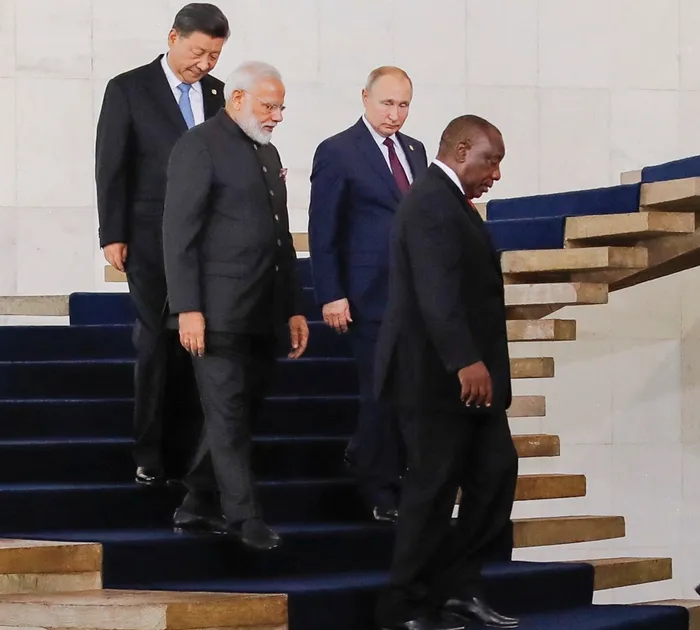Resolving Putin conundrum paves way for BRICS reset on key issues

File PICTURE: ]Sergio LIMA/AFP - China's President Xi Jinping, India's Prime Minister Narendra Modi, Russia's President Vladimir Putin , South Africa's President Cyril Ramaphosa are pictured before posing for a family picture during the 11th BRICS Summit on November 14, 2019 in Brasilia, Brazil. They were hosted by then Brazil President Jair Bolsonaro.
By Professor Sethulego Matebesi
South Africa has been bleeding on many fronts over the past few years. It was thus almost adding more fuel to an already tumultuous situation in the country when Russian President Vladimir Putin insisted on attending the XV BRICS Summit hosted by South Africa at the Sandton Convention Centre in Sandton, Johannesburg, from 22 to 24 August.
President Cyril Ramaphosa was driving on noticeably rougher roads as he commendably led an African delegation to St Petersburg to convince his counterpart to stop the war with Ukraine.
Despite insinuations that Putin was willing to consider this request, the Russian authorities were adamant that their military operation was justified.
The uncertainty around Putin’s attendance and possible arrest because of the arrest warrant issued against the Russian president by the International Criminal Court (ICC) in March for war crimes involving the kidnapping of Ukrainian children were widely covered internationally.
In an outcome that few thought possible, Ramaphosa convinced Putin not to attend the BRICS summit because of the country’s obligation to arrest him as it is a signatory to the agreement establishing the ICC.
This was a master stroke by Ramaphosa. He rose to the occasion and took significant personal risks.
But let me pause!
There may be many others, including the Democratic Alliance, who will question the validity of such assertions. They will wonder to what extent a judgement handed down by the Gauteng High Court ruling that the South African government must publicly and transparently argue its case around the country’s obligation to arrest Putin played. The most that other citizens could realistically do was to hope that the South African government would pursue the best path for the nation and not fall short, as often the case. The Russian Federation will be represented by Foreign Minister Sergey Lavrov. With the uncertainty about Putin’s attendance laid to rest, is South Africa ready to host the BRICS summit?
South Africa’s readiness to host BRICS summit
South Africa’s ability to host major international events is undisputed. In line with this reputation, Ramaphosa is confident that the summit will succeed and calls on the nation to extend the necessary hospitality to the many delegates from various parts of the world. Testimony to this is the advanced readiness of the country to host the BRICS Political Party Dialogue in Gauteng.
As we will soon realise, the primary focus of the BRICS Summit will move from questions about South Africa’s hosting capabilities to the topics and debates at the event.
The first salvo fired at the BRICS Summit has been the invitation of ruling parties in Brazil, India, China and South Africa to the ANC-hosted BRICS Political Parties Forum. In stark contrast to the forum’s purported aim to share experiences on political party renewal and governance, only progressive parties and those with historical relations with the ANC were invited.
While the agenda of the BRICS summit is anticipated to include topics like global governance reform, sustainable development, trade and investment facilitation, and innovation, BRICS’s controversial proposal for a new, gold-backed currency will be one of the focal areas.
In an increasingly tense geopolitical environment, such a bold move by BRICS demonstrates how the partnership has grown in scope and depth since the first summit in Russia in 2009. Perhaps, this is an attempt to address one of the founding values of BRICS: the shared commitment to restructuring the global political, economic and financial architecture to be more equitable, balanced and representative.
Notwithstanding the challenges South Africa faced in hosting the BRICS summit, the pace and rate of change sought by the partners will be determined by sincere debates at the event. It is important to remember that some of the BRICS countries differ fundamentally on many international issues. Thus, the different BRICS partners must be able to defend and advance the interests of their nations while forging collegiality within the partnership. It is for this reason that South Africa should grab the opportunity to demonstrate its capabilities beyond BRICS.
*Sethulego Matebesi is an Associate Professor and Head of the Department of Sociology at the University of the Free State